1 - Introduction to relativism
Summary
Relativism in contemporary thought
Looking back a century, one can see a striking degree of homogeneity among the philosophers of the early twentieth century in terms of the topics central to their concerns. More striking still is the apparent obscurity and abstruseness of those concerns, which seem at first glance to be far removed from the great debates of previous centuries, between realists and idealists, say, or rationalists and empiricists.
The German philosopher Gottlob Frege (1848–1925) devoted his career to the foundations of mathematics and was rewarded with profound indifference from his fellow philosophers and mathematicians. The English philosopher Bertrand Russell (1872–1970) devoted his early work to exactly the same issue, culminating in Principia Mathematica, which was such an intellectual effort, he said, that it rendered him incapable of ever producing such detailed work again. In his early work the Austrian philosopher Ludwig Wittgenstein (1889–1951) focused even more narrowly on a critique of the work of Frege and Russell on the meaning of the logical constants. He also became aware of how much could be gained from such minute examination, saying that his work had widened out from the foundations of logic to the nature of the world. The Austrian philosopher Edmund Husserl (1859–1938) also started with the philosophy of geometry, before developing the phenomenological method, which was geared toward answering questions emerging from his earlier work.
- Type
- Chapter
- Information
- Relativism , pp. 1 - 26Publisher: Acumen PublishingPrint publication year: 2002



